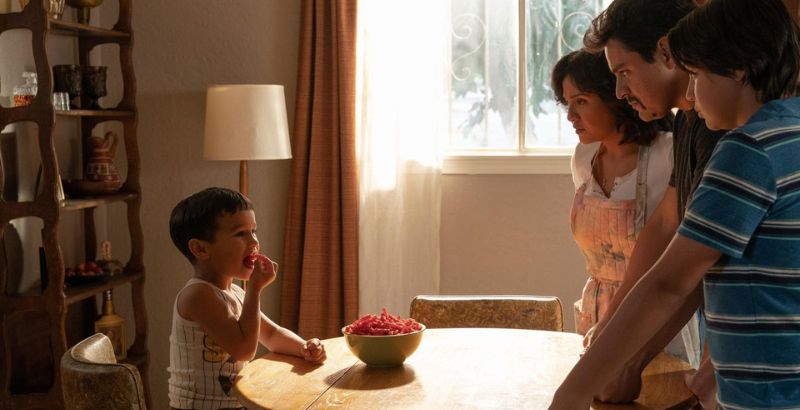There is a beauty to Flamin’ Hot having its world premiere in Texas at the 2023 SXSW Film & TV Festival. The directorial debut for Corpus Christi native Eva Longoria, Flamin’ Hot tells the story of Richard Montañez, the Frito Lay janitor who channeled his Chicano identity into Flamin’ Hot Cheetos. In doing so, he turned the snack into a product that disrupted the food industry and became a global phenomenon. Written by Linda Yvette Chávez and Lewis Colick, the film is based on the memoir by Montañez entitled “Flamin’ Hot: The Incredible True Story of One Man’s Rise from Janitor to Top Executive.”
Let’s get the giant neon red elephant out of the way and say, yes, we all know that Frito Lay has said that Richard didn’t create the Flamin’ Hot Cheeto. But why does that matter? We see biopic after biopic, and some at SXSW exaggerate the truth, and we don’t question it because the urban myth has become a reality, and of course, they’re white people at the center. Why can’t we let Flamin’ Hot live on in the same way? All biopics spin themselves around a kernel of truth, elaborating elements for the screen, stretching the truth, and doing so to get at the moral that the individual is based on stands for.
Here, Longoria has a larger picture that she’s painting for the viewer. The kernel of truth is that Richard Montañez went through hell to get where he ended up. He dealt with racism (interpersonal and systemic), he worked hard to provide for his family in a struggling economy under Reagan that punished the poor, and he did it all by learning to succeed because of his Mexican identity, not in spite of it.
Richard’s story is one I know – at least his beginning. He was the son of farmworkers and one himself, eventually turning to crime to survive until he winds up taking a job as a janitor at Frito Lay. For Richard, all he had was his name and he had to find a way to excel and leave a legacy. That is the truth that Flamin’ Hot builds its narrative on and that is unshakable. Despite the fact that Chicanos love hot Cheetos, this film isn’t about hot chips. It’s about what it means to succeed when everything is stacked against you and to believe in your community and yourself when it’s written off.
Throughout the film, Richard is hit with moments where his Mexican identity is a “weakness” because of the racists around him. Despite this, he keeps on moving forward and begins to embrace his identity, as he says, a superpower. But he had to learn that. Richard had to be the intelligent chingón that his wife Judy saw when she looked at him, and half of that push was to show his children to be proud of themselves as well.
As a Hulu release, Flamin’ Hot can reach so many households, and I hope it does. In one scene where Richard picks his sons up from school, one of them mentions that he was beaten up because he was Mexican. He expresses shame like we saw Richard express in the film’s opening. But it’s met with a truth that resembled what my mom told me time after time when I wanted to quit things because I didn’t look like anyone else in the room.
Being Mexican-American, being Latino, isn’t something to be embarrassed by. It’s a superpower that makes us who we are, and people belittle us because they know that we have the power to knock them out. A small moment in the film, sure, but an important one that shows Richard passing down his pride to his children and, in a way, to the audience as well. Even when we see gang life and cholos on the street, they aren’t vilified but contextualized as people who need to survive. It’s how I know them to be. It’s the reality.
Additionally, Jesse Garcia‘s narration as Richard is purely amazing. Not only does he provide fantastic narration (especially when he compares c-suite executives to cholos and becomes a cholo translator for them) in that perfect storytelling way that only Latinos can do, but it’s also filled with Mexican Spanish idioms and colloquialism that it sounds like my tìo is talking. Flamin’ Hot shows a life I can see myself and my family in. While the situation creates that, it’s also because of strong performances from Garcia and Annie Gonzalez, who plays Richard’s wife, Judy. Their love is passionate and grounded, and it’s clear that Richard is only the man he is because of Judy’s support as she pushes him to reach further. Flamin’ Hot is a success story, but it manages to be a love story too.
This direct discussion of immediate racism is done throughout the film without holding a lot of punches. Unlike other films that limit the marginalization to one big scene for dramatic effect, Longoria represents ugly ways in which racism bubbles up in nearly every situation. It’s how life is. People not pronouncing your name correctly or leaving diacritic marks off of it because it’s too hard. It’s the assumption that you’re not working or that you don’t have the intelligence to do more than menial labor and, of course, it’s the slurs. All of that is packed in here without ever being too much, and in that way, I think Longoria and crew have found the balance of telling life how it is and still managing to appeal to audiences who haven’t experienced that racism firsthand.
Flamin’ Hot is about being unapologetically Mexican-American and that includes our joy, ingenuity, and love of the spicy, and more importantly, the Latino Dollar. As the largest buying power in the United States, Flamin’ Hot puts that fact into focus and it can be expanded beyond the hot chip and into other realms, particularly the film industry. We still only make up 6% of speaking roles, but we are the largest ethnic minority in the United States. We account for such little screen time but we drive ticket sales higher than anyone else.
So who cares that Richard Montañez didn’t make our favorite snack? Making the chip isn’t the focus of the film. It’s a vehicle for Longoria to tell a story that speaks to her community and tells us that we are strong, we are intelligent, and we matter in ways that can move companies.
The truth is that Richard Montañez worked his way up from the bottom in a true success story that embraces his Mexican identity as the reason he succeeded. Flamin’ Hot, like all “based on a true story” narrative features, takes liberties, as Richard may have with his legend, but it still means something. How many biopics about executives are made about people who aren’t white? The answer to that just in the SXSW line-up is one —sitting in the line-up next to Air, Blackberry, and Tetris. Longoria made a great film that tells the families that watch it to embrace Latinidad as their superpower, not as their weakness. And that is something to celebrate.
Flamin’ Hot screened at the 2023 SXSW Film & TV Festival, is available now on Hulu.
Flamin' Hot
-
Rating - 8.5/108.5/10
TL;DR
Flamin’ Hot, like all “based on a true story” narrative features, takes liberties, as Richard may have with his legend, but it still means something…Longoria made a great film that tells the families that watch it to embrace Latinidad as their superpower, not as their weakness. And that is something to celebrate.







